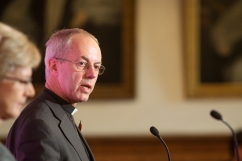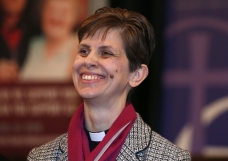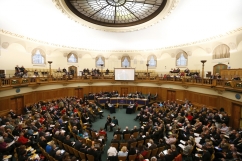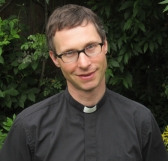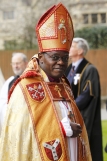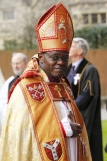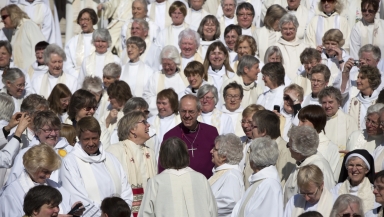
Anyone who imagined that the consecration of Rev Libby Lane as the Church of England's first woman bishop would bring to a close nearly four decades of debate over women's ordination was deluding themselves. Just a week later, also at York Minster, in a highly unusual departure from tradition, just three of the assembled bishops from the northern province will actually lay on hands at the consecration of a new traditionalist bishop, Father Philip North.
The remainder have been asked to hold back out of "gracious restraint" in an attempt to preserve the authenticity of the Apostolic succession as regarded by the Church's traditionalist wing.
As long ago as 1975, the General Synod voted: "This Synod considers that there are no fundamental objections to the ordination of women to the priesthood."
In vain did upporters of women's ordination argue for a change in tradition from the examples of biblical figures such as Phoebe, Junia, Mary Magdalene and the women who witnessed the Resurrection, as well as the women house church leaders in the Early Church.
Since the Oxford Movement and the High Church revival of the 19th century, the Catholic wing had flourished as a socially active as well as devout form of Anglican witness. The movement also seemed to signpost a possible path to reunion with Rome. For a long time, not jeopardising the place of Anglican Catholics in the Church, or increasingly faint hopes of rapprochement with Rome, became a priority of the leadership on a level with, if not higher than, the desire to achieve justice for women.
At the same time, pioneers such as John Stott and later Sandy Millar led an extraordinary evangelical revival through the second half of the 20th century. The headship argument from the writings of St Paul, that the man should be the head of the woman, came to dominate "orthodox" thinking on the issue.
As the secular world moved forward fast on matters of gender equality, the Church of England's liberal wing, the only part arguing forcefully for women's ordination in the Church, began to suffer a loss of momentum, credibility and membership in the face of catholic and evangelical renewal.
Personally, I've always felt the liturgical disasters of the 20th century should bear some responsibility for the divisions and traumas that we are still witnessing today.
I would go to one of the evangelical flagships, All Souls Langham Place, St Helen's Bishopsgate or HTB, and be transported by language and prayer into a world of divine possibility, of restoration, of hope. Then I might drop in at the profoundly catholic All Saints Margaret Street, or St Matthew's Westminster, or one of the divine Pugin chapels that were my favourites, and be lifted heavenwards by the beauty of the Roman-style Mass. Or there were the Chapels Royal, such as at Hampton Court, with the majesty of the 1662 Book of Common Prayer. More often than not, all these churches were full, some with standing room only.
Then I would return to a near empty, more liberal church, using the 1980 Alternative Service Book, the kind of church where for my entire life it seemed I had remained the youngest in the congregation, we baby boomers of the late 1950s seemingly the last generation to turn up. Soon even we began to drop off. We just couldn't take another: "And also with you." Would the story of women's ordination have been better if a more uplifting and inspiring liturgy had been in place across the Church?

As it was, the vote for women priests in 1992 got through on a knife's edge, gaining the two-thirds needed by just two votes. Many Anglo-Catholic clergy at that point took the generous compensation on offer and left for Rome, the Orthodox church or simply to return to secular life. The departure of priests such as Father Peter Geldard left the Church tragically bereft of some enormous gifts and holiness. But enough remained for it to be clear that the road to women bishops would be even more troubled than that to women priests. This was because of the particular authority vested in a bishop.
Jean Mayland, one of the original pioneers of both women's ordination and the ASB, expresses the frustation well. Writing in Ontlook, the magazine of WATCH, in 2001 she wrote: "When women were ordained priests, we expected that the Church would welcome and affirm us. We were prepared to be charitable and recognised the need for a time of reception - giving parishes and individuals the chance to come to terms with the new situation.
"We nevertheless believed that the Church of England had made a decision by which it would stand. Instead we discover that the acceptance is half-hearted, grudging, reluctant and based on the premise that the Church might, in fact, be wrong and all we women priests can be disposed of, dispensed with and wiped off the face of history as a temporary aberration! Meanwhile great care is being shown to the needs, feelings and sensitivities of young men opposed to the priesting of women who are preparing for ordination....What is the justification for going on ordaining young men who will not accept women priests?
"It is one thing to show compassion and concern for older priests who were ordained before the Church of England accepted women priests. It is quite another to perpetuate opposition."
Three years after the process began in 1975, a motion for legislation to remove the barriers to the ordination of women to the priesthood and their consecration to the episcopate was passed by the House of Bishops and the House of Laity, but lost in the House of Clergy by 94 votes to 149.
In 1981 synod voted for the ordination of women deacons should be open to women and passed the legislation in 1985. The first women deacons were ordained in 1987.
In 1984 the General Synod voted for to move forward on women priests but this time there was no reference to bishops. It narrowly passed in 1992 and the first women were ordained priest at Bristol in spring 1994.
The even more difficult path to women bishops kicked off in July 2000, when the synod requested a theological study. The report was debated by synod in February 2005.
Further reports were debated, and in July 2005 the synod voted that "the process for removing the legal obstacles to the ordination of women to the episcopate should now be set in train."
Years more of complex debates followed, and by November 2012 the synod was at last ready to vote on a deeply flawed measure that hardly anyone was happy with and that would have put in place convoluted prodecures to cater to both women bishops, their supporters and the traditionalists and evangelicals on the other side. As an astounded secular world looked on, the legislation was rejected by the synod's house of laity, meaning it could not go through. Mass soul-searching ensured in the Church of England which was subjected to worldwide ridicule but which, in retrospect, did the right thing to refuse that measure at that time.
The process was recommenced the following July, a more simple measure drawn up and finally passed a year later, last July, allowing for the choice of Libby Lane as suffragan bishop of Stockport and many more women bishops surely to follow soon.
Even among Anglo-Catholics, there is a desire to put all the trauma of the past few decades to bed. The deluge of documents and reports setting out strategies for renewed leadership and mission facing the synod over the next few years are at once challenging and exciting. Today's consecration of Libby Lane, and that of Father North a week later, are both to be celebrated and rejoiced. The debates will continue, as the formalities of separate consecrations are finessed. But last the Church and its mission are free to move on with that all important factor, episcopal leadership, given fresh life that can flow throughout the Church, simply because it can now be resourced by 100 per cent and not just 50 per cent of the population of England.










